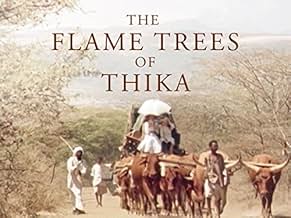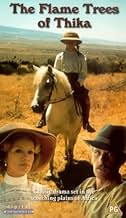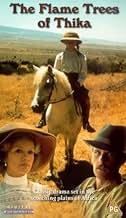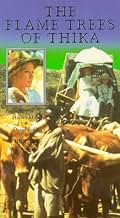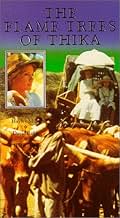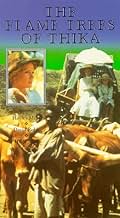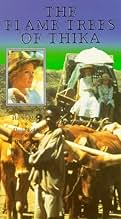Ajouter une intrigue dans votre langueElspeth's family starts a Kenyan coffee plantation. She befriends locals and expats, experiencing nature's beauty and cruelty. An affair between Lettice Palmer and a safari guide runs parall... Tout lireElspeth's family starts a Kenyan coffee plantation. She befriends locals and expats, experiencing nature's beauty and cruelty. An affair between Lettice Palmer and a safari guide runs parallel. World War I changes Elspeth's exciting life.Elspeth's family starts a Kenyan coffee plantation. She befriends locals and expats, experiencing nature's beauty and cruelty. An affair between Lettice Palmer and a safari guide runs parallel. World War I changes Elspeth's exciting life.
- Nomination aux 3 BAFTA Awards
- 3 nominations au total
Parcourir les épisodes
Avis à la une
Sometimes you watch a bit of something, and you just KNOW you're seeing something special.
I first saw this series around 20 years ago as a weekly mini-series on PBS. The wonderful story, great acting, beautiful scenery and haunting music has stayed with me. When I saw the video at our local library I was happy to renew my acquainenance with Elspeth and her family in Kenya. The story plays just as well 20 years later.
Thanks to all who had a part in "The Flame Trees of Thika" for giving us such a gift.
I first saw this series around 20 years ago as a weekly mini-series on PBS. The wonderful story, great acting, beautiful scenery and haunting music has stayed with me. When I saw the video at our local library I was happy to renew my acquainenance with Elspeth and her family in Kenya. The story plays just as well 20 years later.
Thanks to all who had a part in "The Flame Trees of Thika" for giving us such a gift.
To even think that this show is colonialist or smug towards Africans is completely ridiculous and insane at best.
The show couldn't be more positive towards Africans and negative towards white people.
This is one of these strangely manipulative but innocent looking guilt-trip-shows that are very popular in Germany or the USA.
Virtually all white people - besides 2 or 3 exceptions - are ignorant, patronizing and mean while virtually every African - besides 1 exception at best - is a good behaved hard worker.
The supposedly good will of the show doesn't just stop at the skin color of people.
It really likes to contrast super-capable, strong, confident (blonde) women with whiny, hysterical (dark haired) women.
In other words, the more noble the aim, the more pathetic the result.
I even doubt, however, the oh so noble and moral goal of the show. It just feels very wrong-headed and under-complex for the depth of it's topics.
The show couldn't be more positive towards Africans and negative towards white people.
This is one of these strangely manipulative but innocent looking guilt-trip-shows that are very popular in Germany or the USA.
Virtually all white people - besides 2 or 3 exceptions - are ignorant, patronizing and mean while virtually every African - besides 1 exception at best - is a good behaved hard worker.
The supposedly good will of the show doesn't just stop at the skin color of people.
It really likes to contrast super-capable, strong, confident (blonde) women with whiny, hysterical (dark haired) women.
In other words, the more noble the aim, the more pathetic the result.
I even doubt, however, the oh so noble and moral goal of the show. It just feels very wrong-headed and under-complex for the depth of it's topics.
This is an extremely well crafted mini series that depicts one colonial British family's experiences in Kenya. The African wilderness scenery is absolutely breathtaking. It is based on one of three autobiographical books by Elspeth Huxley. I found the series to have a similar flavour to the film Out of Africa (starring Meryl Streep & Robert Redford), another Kenyan coffee plantation saga based on the tale of the Danish woman, Karen (Isak) Dinesen Blixen.
The series chronicles the life experiences of the Grants, an unconventional English family consisting of the mother Tilly, father Robin, and daughter Elspeth. It shows their struggles as they endeavor to establish a coffee plantation in Kenya, their interactions with both the African natives and the other British colonials...all mainly as seen from the perspective of the young Elspeth. The life they establish in Kenya is interrupted by the onset of World War I.
I tuned in to the series mainly because I am quite a fan of Hayley Mills, who is very effective here in her role as Tilly Grant, the lovely mother coping with the challenges of life in an exotic country. Holly Aird is particularly engaging as her inquisitive daughter, Elspeth, who makes friends both from among the British and the native Africans. David Robb plays her handsome father, Robin Grant. Sharon Maughan is the bored Lettice Palmer who has an affair with a safari guide, and Ben Cross the know it all newcomer, Ian Crawfurd.
Personally, I am not much of an advocate of past British (or other European) colonialism which intruded their presumed superior culture onto the supposedly lesser ignorant & savage peoples of Africa, India, or wherever. The efforts of the British to make a good life for themselves were sometimes to the detriment of the native people's. While I am no expert on the historical accuracy of this particular depiction, the natives are portrayed as superstitious, with a possible air of the condescension typical of such colonial tales.
Enthusiasts of the series might not be pleased to read my criticisms of colonialism, but they are true, nevertheless. Despite my general misgivings about such ethical issues, I am ranking this generally well made series quite highly because it does paint such an interesting portrait and is a captivating story of this family's experiences.
The series chronicles the life experiences of the Grants, an unconventional English family consisting of the mother Tilly, father Robin, and daughter Elspeth. It shows their struggles as they endeavor to establish a coffee plantation in Kenya, their interactions with both the African natives and the other British colonials...all mainly as seen from the perspective of the young Elspeth. The life they establish in Kenya is interrupted by the onset of World War I.
I tuned in to the series mainly because I am quite a fan of Hayley Mills, who is very effective here in her role as Tilly Grant, the lovely mother coping with the challenges of life in an exotic country. Holly Aird is particularly engaging as her inquisitive daughter, Elspeth, who makes friends both from among the British and the native Africans. David Robb plays her handsome father, Robin Grant. Sharon Maughan is the bored Lettice Palmer who has an affair with a safari guide, and Ben Cross the know it all newcomer, Ian Crawfurd.
Personally, I am not much of an advocate of past British (or other European) colonialism which intruded their presumed superior culture onto the supposedly lesser ignorant & savage peoples of Africa, India, or wherever. The efforts of the British to make a good life for themselves were sometimes to the detriment of the native people's. While I am no expert on the historical accuracy of this particular depiction, the natives are portrayed as superstitious, with a possible air of the condescension typical of such colonial tales.
Enthusiasts of the series might not be pleased to read my criticisms of colonialism, but they are true, nevertheless. Despite my general misgivings about such ethical issues, I am ranking this generally well made series quite highly because it does paint such an interesting portrait and is a captivating story of this family's experiences.
This is an intriguing curio from British television, based on the autobiographical novel by Elspeth Huxley. The story here sees young Elspeth (Holly Aird) travel out to East Africa with her parents Robin and Tilly Grant (David Robb and Hayley Mills) to set up a new life in the outback during the early 1910's. You sense this is more Robin's idea than a joint venture, but Tilly makes the most of the situation and gradually they build their home there and set up farm land. Soon after they acquire some neighbours, among them game hunter Piet Roos (Morgan Shepherd), Mrs Nimmo (Carol MacCready) and another young couple Hereward and Lettice Palmer (Nicholas Jones and Sharon Maughan), plus the arrival of an enigmatic young stranger in the shape of Ian Crawford (Ben Cross), a Safari guide. But life out in Kenya can be hard and desolate, with many dangers from wild animals, plus the strange customs and beliefs from the natives out there, which makes it all the more fascinating for young Elspeth as she adapts to life there.
I've described Flame Trees as a curio because that is what it is. It was made during a time when TV could just adapt and tell a story involving Brits during the colonization era without being tied up in issues about it's moral aspect. But in fact it gives a fair outlook on both sides of the issue here, with mentions on taking native land and one scene early on when Robin stops Piet Roos from whipping one of his workers to give him "a lesson he needs to learn." But it also doesn't shirk from the natives traditions or superstitions that also dogged their culture, such as one story involving one of the Grants' workers who takes to his bed after another has cursed him for being to blame for the death of his wife and child. As it is autobiographical it tells what it was like out there, not the sanitized version some people may like it to be, and along with the above mentioned it also shows the hardships, the loneliness for some, plus questions the ideas of going out to shoot animals just for "sport", which also leads to one scene where Elspeth admonishes Hereward Palmer for shooting a pregnant antelope, only to later be spanked by her father for refusing to apologize to him.
Elspeth is the main focus on which the story and incidents revolve. She is not always the cause of them, more an observer on life out there, the way the British behave and her fascination with the culture of the natives and her friendship with Njombo (Mick Chege), one of their African workers. Holly Aird is wonderful as Elspeth and carries the plot (such as it is) throughout it's seven episodes. Her innocence and curiosity is what carries this story, learning life lessons along the way, and being a child she is more willing to accept and explore the various native beliefs and superstitions. While some are just that, superstition, others are more spiritual and in one scene she is willing to accept a shaman to bless a baby antelope she has been given to protect it, whereas the adults would of just dismissed it as hocum. And her mother's attempts to be a nurse to the natives inspires her to do much the same with the local wildlife. In one episode she finds an injured pigeon, which she determines to nurse back to health. And the said mentioned antelope, bought as a present for her, often leaves you fearing for it's fate, such are the hazards of Africa. It doesn't sugar coat the reality of Kenya or the struggles to adapt and live out there.
It has to be said that not much actually happens in Flame Trees of Thika. There are incidents, such as Tilly working as a nurse for the natives, a native who believes he has been cursed and the family's attempts to break the native superstition to save him, the murder of a worker, plus the time Elspeth gets left with Mrs Nimmo when her parents go off somewhere and the wild party that occurs. The most prominent storyline involves the arrival of Ian Crawford (a captivating Ben Cross), who falls for the lonely and mentally unstable Lettice Palmer (a very good Sharon Maughan). Ian represents an escape from the loneliness of the outback and the coldness of her husband, who stubbornly refuses to go back. But it only serves to make her more fragile and unstable, not helped when one of her dogs gets killed by a leopard, leading to Hereward determined to track down and kill the leopard to placate his wife. Eventually the outbreak of World War One triggers a motion that breaks up the tranquility of the settlers' existence out there, as the men go off to fight and ultimately tragedy sees the families head back to Blighty. What is left is their experience of a life and culture they knew little about before, and memories of their life out there.
The most remarkable feature of this drama is the presence of Hayley Mills as Tilly Grant. Mills often found the transition from child star to adult career harder due to her breathy almost little girl voice and earnest way of acting, but here you don't notice that it's her. She adapts so well as Elspeth's mother that you just accept her in the role and it's easily one of her best adult performances. She is no shrieking violet when getting stuck into the hard work involved, nor is she scared about going on a hunt and getting close to danger or wild animals. It's a superb performance and deserves a lot of credit for creating a role of a woman just adapting to life out in Africa and all it throws at her. Overall, I found this drama interesting, with Mills in an unexpected role that she totally owns, but it's Holly Aird who is the undoubted star of this, due to being an innocent seeing things with unprejudiced eyes and her embrace of her new homeland. But it's also a strange drama in the fact that not much is actually concluded, and you are left with the feeling of not much actually having happened. It's an interesting curio which proved a big hit in 1981. But as much as I did enjoy it, there is little that lingers long in the memory - except perhaps the shimmering landscape of Kenya and a glimpse into their cultures of the time.
I've described Flame Trees as a curio because that is what it is. It was made during a time when TV could just adapt and tell a story involving Brits during the colonization era without being tied up in issues about it's moral aspect. But in fact it gives a fair outlook on both sides of the issue here, with mentions on taking native land and one scene early on when Robin stops Piet Roos from whipping one of his workers to give him "a lesson he needs to learn." But it also doesn't shirk from the natives traditions or superstitions that also dogged their culture, such as one story involving one of the Grants' workers who takes to his bed after another has cursed him for being to blame for the death of his wife and child. As it is autobiographical it tells what it was like out there, not the sanitized version some people may like it to be, and along with the above mentioned it also shows the hardships, the loneliness for some, plus questions the ideas of going out to shoot animals just for "sport", which also leads to one scene where Elspeth admonishes Hereward Palmer for shooting a pregnant antelope, only to later be spanked by her father for refusing to apologize to him.
Elspeth is the main focus on which the story and incidents revolve. She is not always the cause of them, more an observer on life out there, the way the British behave and her fascination with the culture of the natives and her friendship with Njombo (Mick Chege), one of their African workers. Holly Aird is wonderful as Elspeth and carries the plot (such as it is) throughout it's seven episodes. Her innocence and curiosity is what carries this story, learning life lessons along the way, and being a child she is more willing to accept and explore the various native beliefs and superstitions. While some are just that, superstition, others are more spiritual and in one scene she is willing to accept a shaman to bless a baby antelope she has been given to protect it, whereas the adults would of just dismissed it as hocum. And her mother's attempts to be a nurse to the natives inspires her to do much the same with the local wildlife. In one episode she finds an injured pigeon, which she determines to nurse back to health. And the said mentioned antelope, bought as a present for her, often leaves you fearing for it's fate, such are the hazards of Africa. It doesn't sugar coat the reality of Kenya or the struggles to adapt and live out there.
It has to be said that not much actually happens in Flame Trees of Thika. There are incidents, such as Tilly working as a nurse for the natives, a native who believes he has been cursed and the family's attempts to break the native superstition to save him, the murder of a worker, plus the time Elspeth gets left with Mrs Nimmo when her parents go off somewhere and the wild party that occurs. The most prominent storyline involves the arrival of Ian Crawford (a captivating Ben Cross), who falls for the lonely and mentally unstable Lettice Palmer (a very good Sharon Maughan). Ian represents an escape from the loneliness of the outback and the coldness of her husband, who stubbornly refuses to go back. But it only serves to make her more fragile and unstable, not helped when one of her dogs gets killed by a leopard, leading to Hereward determined to track down and kill the leopard to placate his wife. Eventually the outbreak of World War One triggers a motion that breaks up the tranquility of the settlers' existence out there, as the men go off to fight and ultimately tragedy sees the families head back to Blighty. What is left is their experience of a life and culture they knew little about before, and memories of their life out there.
The most remarkable feature of this drama is the presence of Hayley Mills as Tilly Grant. Mills often found the transition from child star to adult career harder due to her breathy almost little girl voice and earnest way of acting, but here you don't notice that it's her. She adapts so well as Elspeth's mother that you just accept her in the role and it's easily one of her best adult performances. She is no shrieking violet when getting stuck into the hard work involved, nor is she scared about going on a hunt and getting close to danger or wild animals. It's a superb performance and deserves a lot of credit for creating a role of a woman just adapting to life out in Africa and all it throws at her. Overall, I found this drama interesting, with Mills in an unexpected role that she totally owns, but it's Holly Aird who is the undoubted star of this, due to being an innocent seeing things with unprejudiced eyes and her embrace of her new homeland. But it's also a strange drama in the fact that not much is actually concluded, and you are left with the feeling of not much actually having happened. It's an interesting curio which proved a big hit in 1981. But as much as I did enjoy it, there is little that lingers long in the memory - except perhaps the shimmering landscape of Kenya and a glimpse into their cultures of the time.
When I saw this back in the eighties, I watched it religiously. It was an interesting story that kept unfolding week after week. This is a story about wanting. The wanting to conquer the African wilderness and make a good life for yourself and your family OR the wanting to break away from a life that seems like a prison cell, so you can love and live free from what's expected from you.
This had a top notch cast featuring Hayley Mills and handsome David Robb as the Grant's, a couple looking to make a life for themselves in the wilds that is Africa. Then you have Nicholas Jones and (Nescafe's UK/Tasters Choice US)Sharon Maughan as the Palmer's, a couple who are trying to make a relationship work by getting away from England and going somewhere new.
The actors are all great in this series, but the ones who make this one work are Ms Maughan, Ben Cross as the suave handsome know-it-all newcomer Ian, and the Grant's cute and inquisitive daugther Elspeth played by Holly Aird. Elspeth sort of ties everything together and makes things happen, sometimes for good and sometimes for bad. The script is well written and at times very exciting.
I guess the real star of the series must be the beautiful scenery. Watch this and you wonder how man can destroy such a wondrous place. If you get the chance, SEE THIS!!
This had a top notch cast featuring Hayley Mills and handsome David Robb as the Grant's, a couple looking to make a life for themselves in the wilds that is Africa. Then you have Nicholas Jones and (Nescafe's UK/Tasters Choice US)Sharon Maughan as the Palmer's, a couple who are trying to make a relationship work by getting away from England and going somewhere new.
The actors are all great in this series, but the ones who make this one work are Ms Maughan, Ben Cross as the suave handsome know-it-all newcomer Ian, and the Grant's cute and inquisitive daugther Elspeth played by Holly Aird. Elspeth sort of ties everything together and makes things happen, sometimes for good and sometimes for bad. The script is well written and at times very exciting.
I guess the real star of the series must be the beautiful scenery. Watch this and you wonder how man can destroy such a wondrous place. If you get the chance, SEE THIS!!
Le saviez-vous
- AnecdotesAlthough billed as a novel, Elspeth Huxley's 1959 book was in fact a semi-autobiographical work, based on her upbringing in the former British East Africa. She corresponds to the Holly Aird character.
Meilleurs choix
Connectez-vous pour évaluer et suivre la liste de favoris afin de recevoir des recommandations personnalisées
- How many seasons does The Flame Trees of Thika have?Alimenté par Alexa
Détails
Contribuer à cette page
Suggérer une modification ou ajouter du contenu manquant


